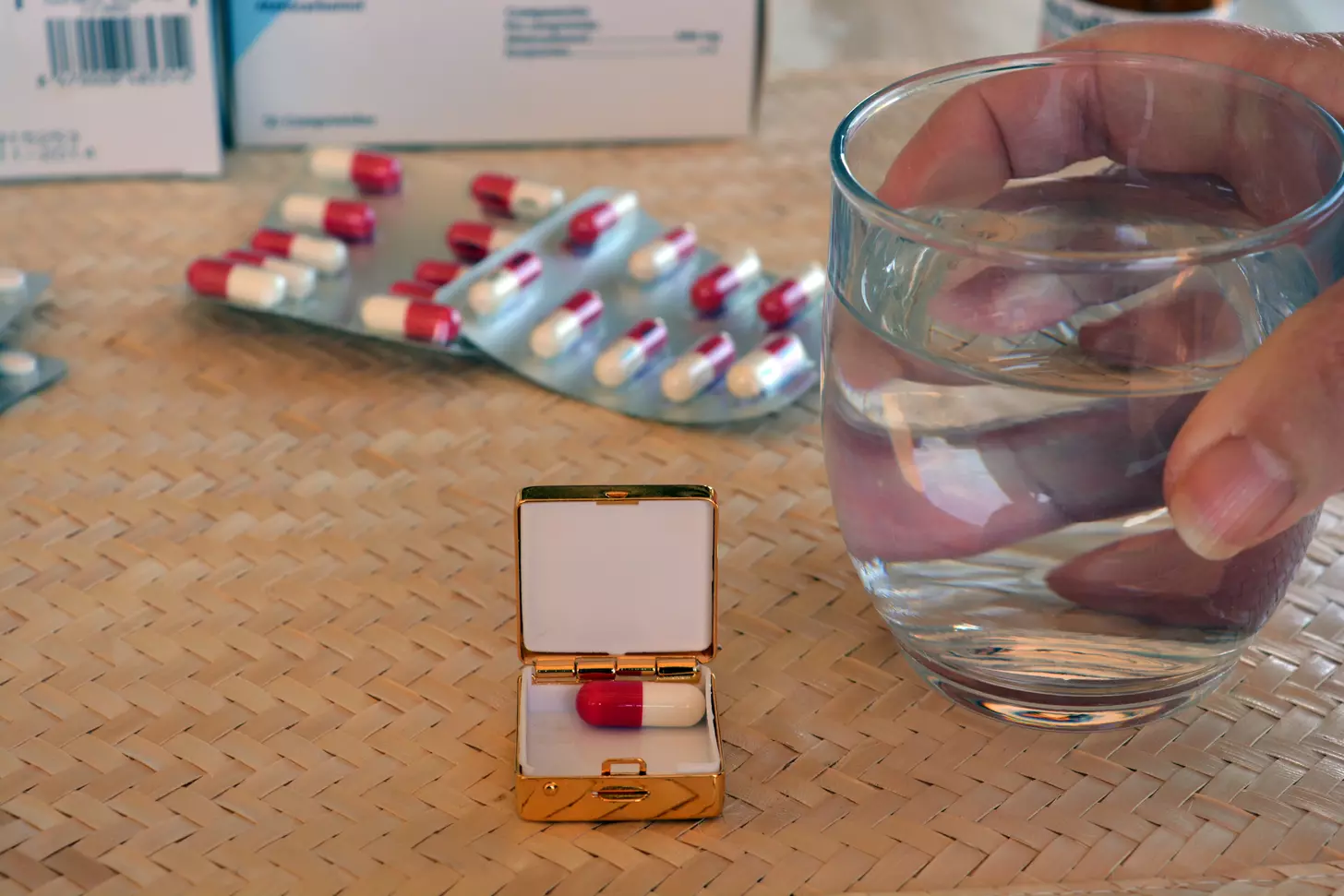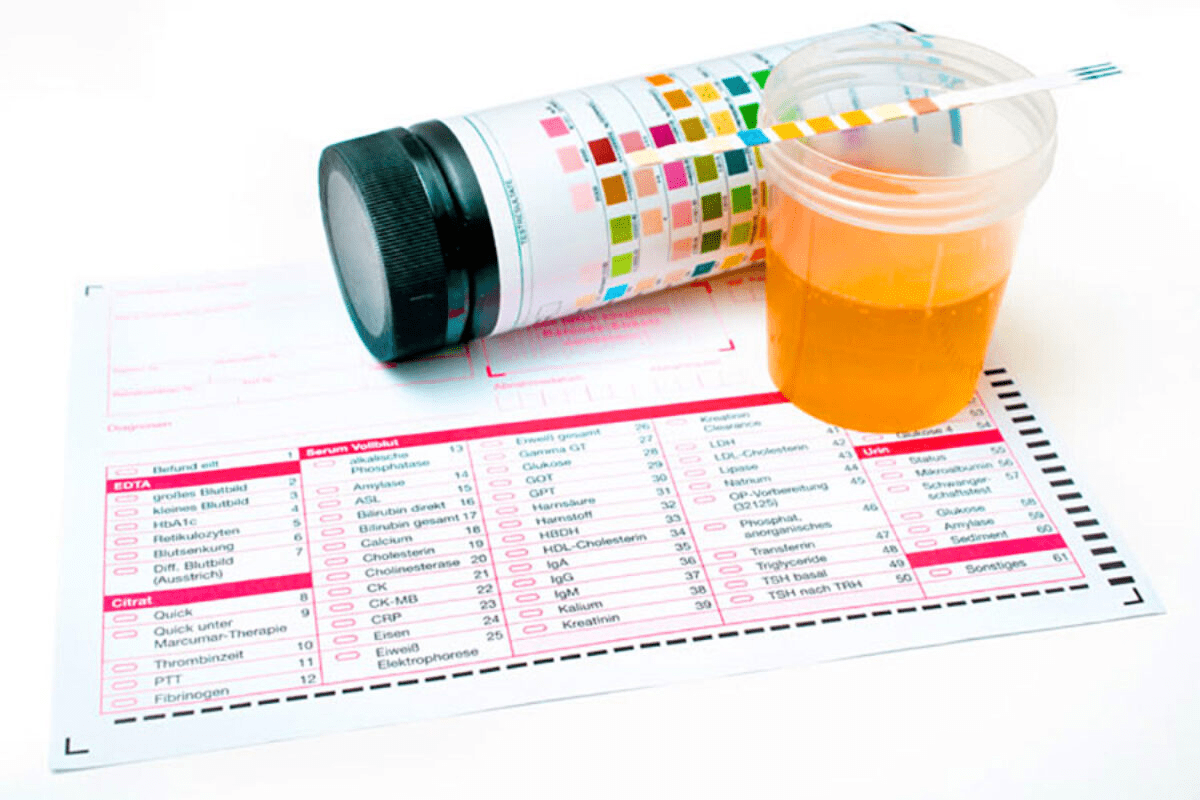Last Updated on November 26, 2025 by Bilal Hasdemir
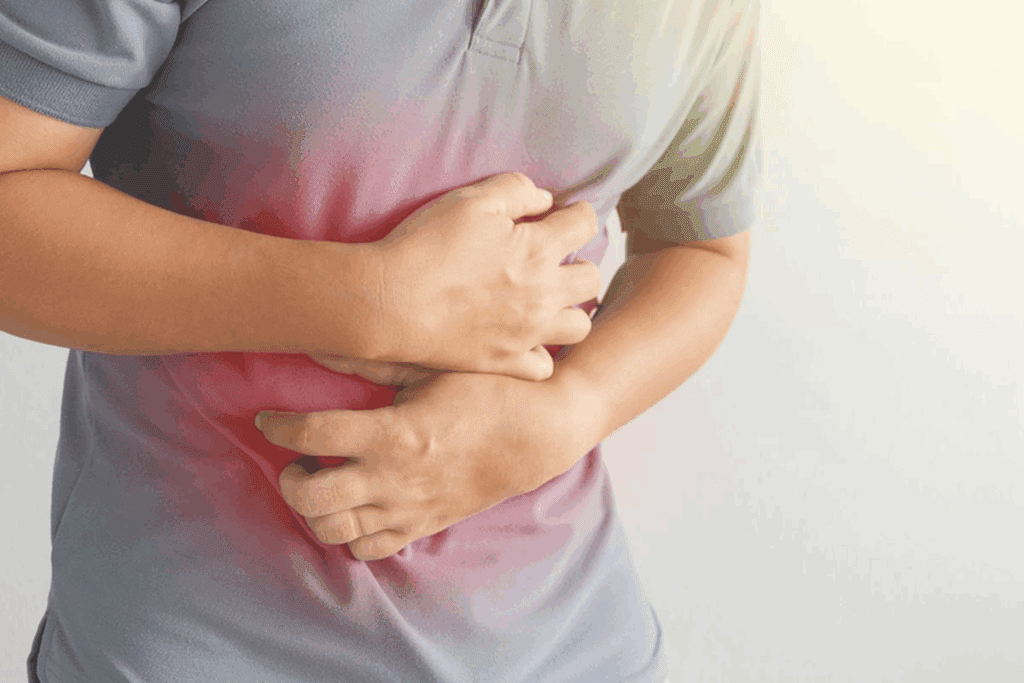
Going through chemotherapy is tough for cancer patients. One big problem is diarrhea. It really hurts their quality of life.
Chemotherapy attacks fast-growing cells, like those in the gut. This leads to side effects like diarrhea. Diarrhea makes you go to the bathroom a lot and can be very uncomfortable.
It’s important to know why, how, and how to deal with chemotherapy-induced diarrhea. We’ll look into all these to help patients and their families handle it better.
Key Takeaways
- Chemotherapy can cause diarrhea due to its impact on the gastrointestinal tract.
- Managing diarrhea is crucial for maintaining the patient’s quality of life.
- Understanding the causes and symptoms of chemotherapy-induced diarrhea is essential.
- Comprehensive care for cancer patients includes addressing chemo side effects.
- Effective diarrhea treatment can significantly improve patient comfort.
The Connection Between Chemotherapy and Digestive Issues
It’s important to know how chemotherapy impacts the digestive system to manage side effects. Chemotherapy is a key treatment for many cancers. Yet, it can cause significant problems with digestion.
How Chemotherapy Affects the Digestive System
Chemotherapy targets cells that grow fast, like cancer cells and the digestive tract lining. This can damage the intestinal lining, causing various digestive symptoms.
Chemotherapy drugs can harm the digestive system in several ways:
- Damage to the mucosal lining of the intestines
- Alterations in gut motility
- Changes in the gut microbiome
- Increased permeability of the intestinal wall
These changes can cause symptoms like diarrhea, nausea, and vomiting. The severity and how long these symptoms last can vary. This depends on the type of chemotherapy, dosage, and individual factors.
Common Gastrointestinal Side Effects
The gastrointestinal side effects of chemotherapy can be diverse and affect patients’ quality of life. Some common side effects include:
| Side Effect | Description |
| Diarrhea | Frequent and loose stools, potentially leading to dehydration |
| Nausea and Vomiting | Feeling queasy or vomiting, which can lead to nutritional deficiencies |
| Mucositis | Inflammation and ulceration of the mucous membranes lining the digestive tract |
It’s crucial to manage these side effects well. This helps keep the patient’s nutritional status and overall well-being during chemotherapy.
Understanding Chemotherapy Diarrhea: Causes and Mechanisms
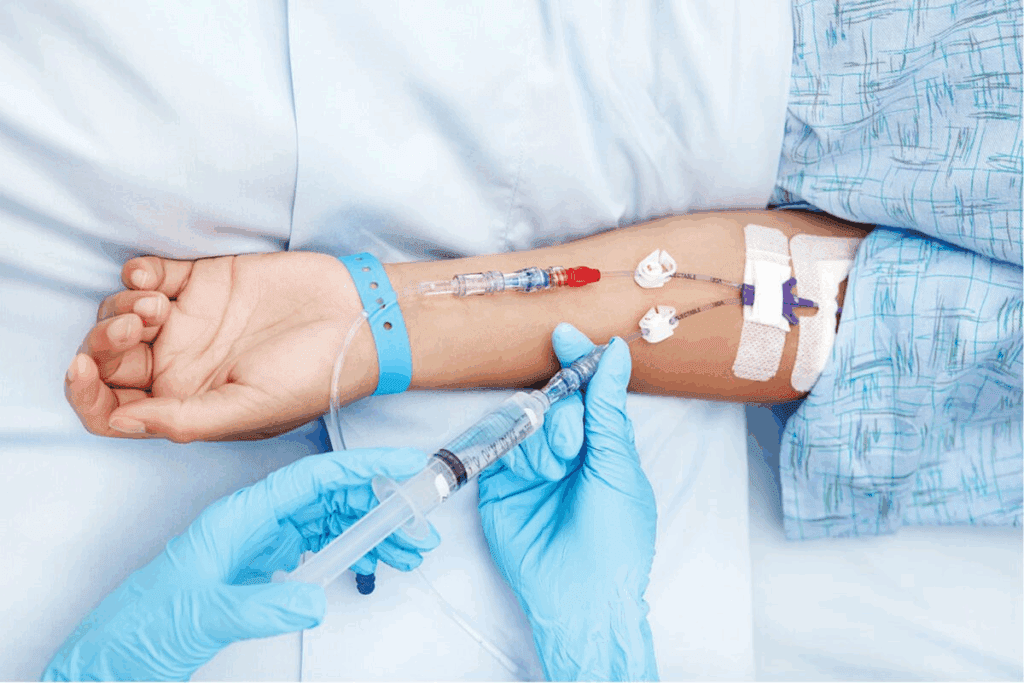
Chemotherapy-induced diarrhea is a complex issue. It comes from damage to the intestinal lining and changes in the gut microbiome. This condition greatly affects the quality of life for patients undergoing chemotherapy. It’s important to understand its causes.
Damage to Intestinal Cells
Chemotherapy targets fast-growing cells, including those in the gut. This causes damage to the intestinal lining. As a result, the lining can’t absorb fluids and electrolytes well. Patients may then experience diarrhea because of this.
The damage to intestinal cells also lowers the production of digestive enzymes. This makes digestion harder. The damage to cells and the digestive process both play a part in causing diarrhea.
Changes in Gut Microbiome
The gut microbiome is key to the gut’s health. Chemotherapy can upset this balance by reducing good bacteria and increasing bad ones. This imbalance, or dysbiosis, can cause diarrhea among other symptoms.
Studies show that the gut microbiome’s makeup affects how bad chemotherapy-induced diarrhea is. Knowing this can help find ways to lessen this side effect.
Inflammatory Responses
Chemotherapy can also cause inflammation in the gut. This inflammation is due to the chemotherapy’s direct harm to the intestinal lining and the release of pro-inflammatory cytokines.
Controlling this inflammation is key to managing diarrhea caused by chemotherapy. This can involve using anti-inflammatory drugs and other supportive care. These measures can help reduce diarrhea and improve patient outcomes.
Types of Chemotherapy Most Likely to Cause Diarrhea
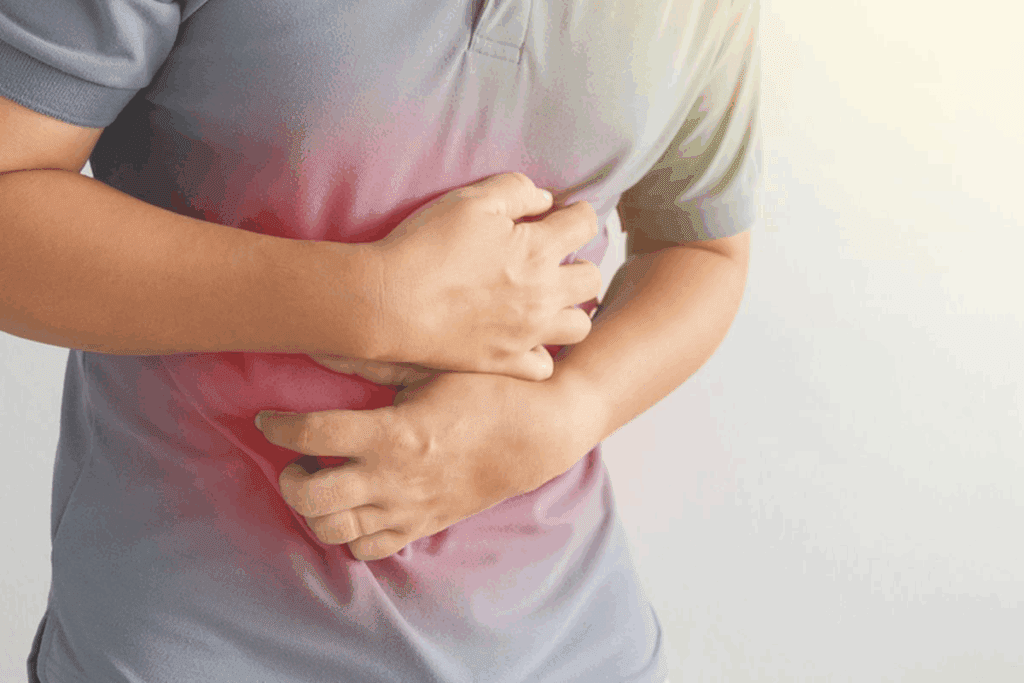
Some chemotherapy drugs are more likely to cause diarrhea than others. Knowing which drugs are most likely to cause this side effect helps both patients and healthcare providers manage it better.
5-Fluorouracil (5-FU) and Related Drugs
5-Fluorouracil (5-FU) is a chemotherapy drug that often leads to diarrhea. It works by stopping cancer cells from growing by interfering with DNA synthesis. But it can also harm the intestines, causing diarrhea. Drugs like capecitabine, related to 5-FU, can have similar effects.
Irinotecan and Topoisomerase Inhibitors
Irinotecan is another drug that often causes diarrhea. It stops cancer cells from reproducing by preventing the enzyme topoisomerase from working. This can also lead to gastrointestinal side effects, including diarrhea.
Targeted Therapies and Immunotherapies
Targeted therapies and immunotherapies are newer cancer treatments that can cause diarrhea. They target specific molecules involved in cancer growth or boost the immune system to fight cancer. Even though they are more targeted, they can still cause significant gastrointestinal side effects, including diarrhea.
| Chemotherapy Drug | Mechanism of Action | Gastrointestinal Side Effects |
| 5-Fluorouracil (5-FU) | Interferes with DNA synthesis | Diarrhea, mucositis |
| Irinotecan | Topoisomerase inhibitor | Diarrhea, nausea |
| Targeted Therapies (e.g., tyrosine kinase inhibitors) | Targets specific molecules involved in cancer growth | Diarrhea, gastrointestinal perforation |
| Immunotherapies (e.g., checkpoint inhibitors) | Boosts the immune system to fight cancer | Diarrhea, colitis |
Severity and Duration of Chemotherapy-Induced Diarrhea
It’s important to know how bad and long chemotherapy-induced diarrhea lasts. This helps decide the best treatment. Diarrhea can really affect a patient’s life, so knowing its severity is key.
Grading Systems for Diarrhea Severity
Doctors use grading systems to measure diarrhea’s severity. The Common Terminology Criteria for Adverse Events (CTCAE) is a common one. It rates diarrhea from 1 (mild) to 5 (severe).
Table: CTCAE Grading for Diarrhea
| Grade | Description |
| 1 | Increase of |
| 2 | Increase of 4-6 stools per day over baseline; moderate increase in ostomy output compared to baseline |
| 3 | Increase of >= 7 stools per day over baseline; hospitalization indicated; severe increase in ostomy output compared to baseline; limiting self-care ADL |
| 4 | Life-threatening consequences; urgent intervention indicated |
| 5 | Death |
Acute vs. Chronic Diarrhea
Diarrhea from chemotherapy can be acute or chronic. Acute diarrhea happens during or right after treatment and usually goes away on its own. Chronic diarrhea lasts longer and needs more treatment.
Timeline Expectations
How long diarrhea lasts can vary a lot. Acute diarrhea usually stops a few days after treatment ends. But some people might have diarrhea that lasts longer. Knowing when diarrhea should stop helps plan better.
Understanding the severity and how long diarrhea lasts helps patients and doctors manage it better. This improves how well patients do and their quality of life.
Risk Factors for Developing Diarrhea During Chemotherapy
Knowing the risk factors for diarrhea during chemotherapy is key to managing it. Some factors can make a patient more likely to get diarrhea. Identifying these can help in creating better prevention and management plans.
Pre-existing Digestive Conditions
People with digestive issues are more likely to get diarrhea during chemotherapy. Conditions like irritable bowel syndrome (IBS), Crohn’s disease, or ulcerative colitis can make the digestive system more sensitive. It’s important for patients to tell their healthcare providers about any digestive conditions they have.
| Pre-existing Condition | Risk Level | Management Strategy |
| Irritable Bowel Syndrome (IBS) | High | Dietary adjustments, stress management |
| Crohn’s Disease | High | Medication adjustment, close monitoring |
| Ulcerative Colitis | High | Medication adjustment, regular check-ups |
Radiation Therapy Combination
Chemotherapy with radiation therapy, especially in the abdominal area, raises the risk of diarrhea. Radiation can harm the cells lining the intestines, making chemotherapy’s effects worse. Patients getting both treatments should be watched closely for diarrhea signs.
“The combination of chemotherapy and radiation therapy can lead to an increased incidence of gastrointestinal side effects, including diarrhea.”
— Oncology Research Team
Dosage and Treatment Schedule
The dosage and schedule of chemotherapy can also affect the risk of diarrhea. Higher doses and more frequent treatments can make side effects worse. Changing the treatment schedule or dosage might help lessen these effects.
Understanding these risk factors helps healthcare providers create better strategies to manage and prevent diarrhea in chemotherapy patients. This proactive approach can greatly improve these patients’ quality of life.
Recognizing Symptoms of Chemotherapy Diarrhea
It’s key to spot the signs of chemotherapy diarrhea early. This helps in getting the right treatment quickly. We’ll show you how to recognize early signs, severe symptoms, and how to tell them apart from other stomach problems.
Early Warning Signs
The first signs of chemotherapy diarrhea are often small but important. Look out for:
- Loose stools or a sudden increase in bowel movements
- Mild abdominal cramps or discomfort
- A feeling of urgency to have a bowel movement
Watching these signs closely is crucial because they can get worse fast if not treated right away.
Severe Symptoms Requiring Immediate Attention
While you can manage early signs, severe symptoms need quick medical help. These include:
- Frequent, watery stools that are bloody or black
- Severe abdominal pain or cramping
- Signs of dehydration, such as excessive thirst, dark urine, or dizziness
Severe diarrhea can cause dehydration and electrolyte imbalances, which are serious and need fast treatment.
Differentiating from Other Digestive Issues
Telling chemotherapy diarrhea apart from other stomach problems can be tough. But, if you’re getting chemo and notice:
- A sudden change in bowel habits
- Diarrhea that keeps coming back or gets worse
Seeing your doctor is very important. They can figure out what’s wrong and how to fix it.
| Symptom | Chemotherapy Diarrhea | Other Digestive Issues |
| Onset | Suddenly, often within days of chemotherapy | Variability can be gradual |
| Duration | Can last or come back with each treatment cycle | Varies depending on the cause |
| Associated Symptoms | Abdominal cramps, dehydration | Can include bloating, gas, or abdominal pain |
Complications of Untreated Chemotherapy Diarrhea
Untreated chemotherapy-induced diarrhea can cause serious health problems. It’s important for patients to know these risks. They should work closely with their healthcare team to manage these issues.
Dehydration and Electrolyte Imbalances
Dehydration is a major risk of chemotherapy diarrhea. It happens when the body loses too much fluid. This can upset the balance of fluids and electrolytes in the body.
Electrolytes like potassium and sodium are crucial for nerve and muscle function. An imbalance can lead to muscle weakness, heart problems, and even seizures.
Dehydration can be categorized into three levels:
| Level | Symptoms | Action Required |
| Mild | Thirst, dry mouth | Increase fluid intake |
| Moderate | Dark urine, decreased urine output, dizziness | Medical evaluation, intravenous fluids |
| Severe | Rapid heartbeat, low blood pressure, confusion | Immediate medical attention |
Malnutrition and Weight Loss
Prolonged diarrhea can cause malnutrition. The body can’t absorb enough nutrients from food. This can lead to significant weight loss and weaken the patient’s health.
Maintaining adequate nutrition is crucial during cancer treatment. Patients should work with a dietitian to create a personalized nutrition plan. This helps manage diarrhea and ensures they get the necessary nutrients.
Impact on Treatment Efficacy
Untreated chemotherapy diarrhea can affect treatment success. Severe diarrhea may require reducing the chemotherapy dosage or delaying treatment. This can impact the overall outcome of cancer therapy.
By understanding the potential complications of chemotherapy diarrhea, patients and healthcare providers can work together. They can implement effective management strategies. This minimizes the risk of complications and ensures the best possible outcome for the patient.
Medical Treatments for Chemotherapy Diarrhea
There are many medical treatments for diarrhea caused by chemotherapy. These treatments aim to lessen the diarrhea’s impact. They help improve the patient’s quality and prevent serious issues.
Over-the-Counter Medications
Over-the-counter (OTC) drugs are key for mild to moderate diarrhea. Loperamide is a top choice. It slows down the intestines, helping the body absorb more water and electrolytes.
Prescription Antidiarrheal Drugs
For severe diarrhea, stronger prescription drugs are needed. These include more potent loperamide or other prescription options. Always follow your doctor’s advice when using these medications.
Antibiotics for Bacterial Overgrowth
Antibiotics might be needed if diarrhea is due to bacterial overgrowth. The right antibiotic depends on the bacteria and the patient’s health.
Here’s a quick look at the treatments for chemotherapy-induced diarrhea:
| Treatment Type | Examples | Use Cases |
| Over-the-Counter Medications | Loperamide | Mild to moderate diarrhea |
| Prescription Antidiarrheal Drugs | Stronger loperamide formulations | Severe diarrhea |
| Antibiotics | Various antibiotics based on bacterial type | Diarrhea caused by bacterial overgrowth |
Dietary Strategies to Manage Chemotherapy Diarrhea
Diet plays a big role in easing chemotherapy diarrhea symptoms. By choosing the right foods, patients can manage their condition better. This improves their quality during treatment.
The BRAT Diet and Other Restrictive Approaches
The BRAT diet is a common choice for diarrhea management. It includes Bananas, Rice, Applesauce, and Toast. These foods are low in fiber, fat, and spice, making them easy to digest.
- Bananas: Easy to digest and a good source of potassium.
- Rice: White rice is preferred as it’s lower in fiber compared to brown rice.
- Applesauce: Choose unsweetened applesauce to avoid added sugars.
- Toast: Plain toast made from white bread is recommended.
Other diets, like low-fiber or avoiding spicy and fatty foods, can also help. Always talk to a healthcare provider or dietitian to find the best diet for you.
Foods to Avoid During Flare-ups
When diarrhea strikes, it’s key to avoid certain foods. These can make symptoms worse. Here are some foods to steer clear of:
- High-fiber foods: Raw fruits, vegetables, and whole grains can be hard to digest.
- Fatty or greasy foods: Fried foods and high-fat dairy products can upset the stomach.
- Spicy foods: Spices can irritate the gut and make diarrhea worse.
- Caffeine and alcohol: Both can make bowel movements more active and worsen symptoms.
Staying away from these foods can help manage diarrhea and reduce discomfort.
Hydration and Electrolyte Replacement
Staying hydrated is key when dealing with chemotherapy diarrhea. Diarrhea can cause dehydration and electrolyte imbalances. These can be serious if not treated.
To stay hydrated:
- Drink plenty of fluids: Water, clear broths, and electrolyte-rich drinks like coconut water or sports drinks are good choices.
- Monitor electrolyte levels: Diarrhea can lead to electrolyte imbalances. Eating foods or taking supplements rich in electrolytes can help.
Watch for signs of dehydration like excessive thirst, dark urine, or dizziness. If you notice these, seek medical help right away.
Nutritional Supplements for Diarrhea Support
Nutritional supplements are key for patients with diarrhea during chemotherapy. They help lessen diarrhea’s impact and keep patients healthy.
Probiotics and Gut Health
Probiotics are live microorganisms that are good for health. They help fix the gut microbiome, which gets upset during chemotherapy. Probiotics can cut down on diarrhea’s frequency and severity by making the gut healthy.
“The use of probiotics in managing chemotherapy-induced diarrhea has shown promising results,” as they help in maintaining the integrity of the intestinal lining and enhancing the immune system.
Glutamine and Intestinal Repair
Glutamine is an amino acid that fuels the intestines’ cells. During chemotherapy, the body needs more glutamine. Glutamine supplements may help fix and keep the intestines strong.
Vitamin and Mineral Supplementation
Vitamins and minerals are vital for health, and diarrhea can deplete them. Supplements with vitamins and minerals, especially potassium and magnesium, can prevent deficiencies.
It’s important for patients to talk to their doctor before starting any supplements. This ensures they are safe and needed.
“Adequate nutrition is vital for patients undergoing chemotherapy, and nutritional supplements can play a supportive role in managing treatment side effects,” says a cancer care nutrition specialist
Integrative and Complementary Approaches
There are ways to manage diarrhea caused by chemotherapy that go beyond traditional treatments. These methods focus on treating the whole person, not just the symptoms. They can help improve the quality of life and offer relief.
Acupuncture and Traditional Chinese Medicine
Acupuncture is a key part of traditional Chinese medicine. It involves putting thin needles into specific points on the body. Research shows it can help with diarrhea caused by chemotherapy by improving bowel movements and reducing inflammation.
Benefits of Acupuncture: Studies have found that acupuncture can lessen the severity of diarrhea. It also improves digestion and boosts patient well-being. It’s safe when done by a licensed practitioner.
Herbal Remedies with Research Support
Some herbal remedies may help with diarrhea caused by chemotherapy. For example, ginger and turmeric have anti-inflammatory properties. We’ll look at the evidence for these and other herbal remedies.
- Ginger: Known for its anti-inflammatory properties, ginger can help reduce nausea and diarrhea.
- Turmeric: Contains curcumin, which has potent anti-inflammatory and antioxidant effects.
- Slippery Elm: May help protect and soothe the mucous membranes in the digestive tract.
Mind-Body Techniques for Symptom Management
Mind-body techniques like meditation, yoga, and deep breathing can help with stress and anxiety from chemotherapy-induced diarrhea. These practices promote relaxation and can improve overall well-being.
Mindfulness and Relaxation: Techniques such as mindfulness meditation and progressive muscle relaxation can reduce stress and improve symptoms. They are easy to learn and can be practiced at home.
By adding integrative and complementary approaches to their care plan, patients can manage their diarrhea better. It’s important to talk to healthcare providers before starting any new therapies to make sure they are safe and right for you.
Emotional and Psychological Aspects of Coping
Chemotherapy-induced diarrhea can really affect a patient’s life. It impacts not just their health but also their mood. Living with diarrhea during treatment can be tough, affecting many parts of a patient’s life.
Managing Social and Quality of Life Impacts
Diarrhea can make patients feel isolated. They might stay home to avoid accidents or find restrooms quickly. It’s key for patients to talk to their loved ones about their needs to stay connected.
Small changes can make a big difference. Knowing where restrooms are, carrying extra clothes, and using protective items can help. These steps can reduce anxiety and manage the condition better.
Keeping up with activities they enjoy can also help. Doing hobbies or spending time with family can offer support and take their mind off the discomfort.
Communication Strategies with the Healthcare Team
Talking openly with the healthcare team is vital for managing diarrhea. Patients should tell their doctors about their symptoms right away. Keeping a diary of symptoms can be useful, helping to spot patterns or triggers.
“Open communication with your healthcare provider about your symptoms can significantly improve your quality of life during chemotherapy,” says an oncology expert
Support Resources for Patients
Having access to support can greatly help patients deal with the emotional side of diarrhea. Support groups, whether in-person or online, offer a sense of community. They connect patients with others facing similar issues.
Mental health professionals can also help. They can teach ways to manage anxiety and depression. Cognitive-behavioral therapy (CBT) and other therapies can be very helpful.
By focusing on the emotional and psychological sides of diarrhea, healthcare providers can give better care. This improves patients’ lives during treatment.
When to Contact Your Healthcare Provider
Knowing when to reach out to your healthcare provider about diarrhea during chemotherapy is key. Your healthcare team is there to support you. Talking to them early can help manage side effects better.
Emergency Warning Signs
Certain symptoms need immediate attention. If you notice any of these, get medical help right away:
- Severe dehydration: Look out for excessive thirst, dark urine, dizziness, or fainting.
- Bloody stools: Seeing blood in your stool means you should tell your healthcare provider right away.
- Severe abdominal pain: Pain that’s intense or lasts a long time needs a healthcare professional’s check.
- Fever: A high temperature could mean an infection that needs quick treatment.
Tracking and Reporting Symptoms
Keeping a symptom journal can help your healthcare provider understand you better. We suggest tracking:
- The frequency and consistency of your stools
- Any symptoms like abdominal pain or cramping
- Your fluid intake and output
- Any medications you’re taking, including antidiarrheal drugs
Telling your healthcare provider about these details can help tailor your treatment.
Questions to Ask Your Oncology Team
Being proactive about your care can help manage diarrhea better. Ask your oncology team:
- What are the best ways to manage diarrhea during my treatment?
- Are there any specific medications or dietary changes that can help?
- How can I prevent dehydration?
- When should I seek immediate medical attention?
By staying informed and talking openly with your healthcare provider, you can better handle chemotherapy-induced diarrhea.
Conclusion: Living Well During Chemotherapy Despite Digestive Challenges
Chemotherapy-induced diarrhea can really affect a patient’s life. But, with the right management and support, its impact can lessen. We’ve looked into the many sides of chemotherapy diarrhea, from what causes it to how to treat it.
Patients can take steps to handle their symptoms by knowing the link between chemotherapy and digestive problems. They should be aware of which chemotherapy types lead to diarrhea and spot symptoms early.
To live well during chemotherapy, a full plan is needed. This includes medical treatments, changing diets, and using integrative therapies. Working with their healthcare team, patients can create a plan to manage diarrhea and other side effects. This improves their quality of life.
Handling chemotherapy side effects well lets patients focus on getting better and keep their dignity. With the right help and strategies, patients can face chemotherapy’s challenges with confidence.
FAQ
What is chemotherapy-induced diarrhea?
Chemotherapy-induced diarrhea is a side effect of cancer treatment. It causes loose stools and frequent bowel movements. This happens because chemotherapy damages the intestinal lining and changes the gut microbiome.
Which chemotherapy agents are most likely to cause diarrhea?
Some chemotherapy agents like 5-Fluorouracil (5-FU), irinotecan, and certain targeted therapies and immunotherapies can cause diarrhea. They affect the gastrointestinal tract.
How can chemotherapy-induced diarrhea be managed?
To manage it, you can use over-the-counter and prescription antidiarrheal medications. Changing your diet to the BRAT diet can also help. Drinking plenty of water and replacing lost electrolytes is crucial. Probiotics and glutamine can also be beneficial.
What are the risk factors for developing diarrhea during chemotherapy?
Risk factors include having digestive conditions before treatment. Using radiation therapy with chemotherapy also increases the risk. The dosage and treatment schedule of chemotherapy play a role, too.
What are the potential complications of untreated chemotherapy-induced diarrhea?
Untreated diarrhea can lead to dehydration and electrolyte imbalances. It can also cause malnutrition, weight loss, and affect the treatment’s effectiveness.
When should I contact my healthcare provider regarding chemotherapy-induced diarrhea?
Contact your healthcare provider if symptoms are severe, you show signs of dehydration, or if diarrhea persists or gets worse. It’s important to report your symptoms to your oncology team.
Can dietary changes help manage chemotherapy-induced diarrhea?
Yes, dietary changes can help. Following the BRAT diet and avoiding certain foods during flare-ups can alleviate symptoms. Ensuring you drink enough water and replace lost electrolytes is also important.
Are there any nutritional supplements that can support patients with chemotherapy-induced diarrhea?
Yes, supplements like probiotics for gut health and glutamine for intestinal repair can be beneficial. Certain vitamins and minerals can also help manage diarrhea and support overall health.
What are some integrative and complementary approaches to managing chemotherapy-induced diarrhea?
Integrative approaches include acupuncture, traditional Chinese medicine, and herbal remedies with research support. Mind-body techniques may also help manage symptoms.
How can I cope with the emotional and psychological impact of chemotherapy-induced diarrhea?
To cope, maintain social interactions and quality of life. Communicate effectively with your healthcare team. Accessing support resources for patients is also important.
References
Stein, A., Voigt, W., & Jordan, K. (2010). Chemotherapy-induced diarrhea: pathophysiology, frequency, and guideline-based management. Journal of Clinical Oncology / PMC, 28(15), e566–e573. https://www.ncbi.nlm.nih.gov/pmc/articles/PMC3126005/


